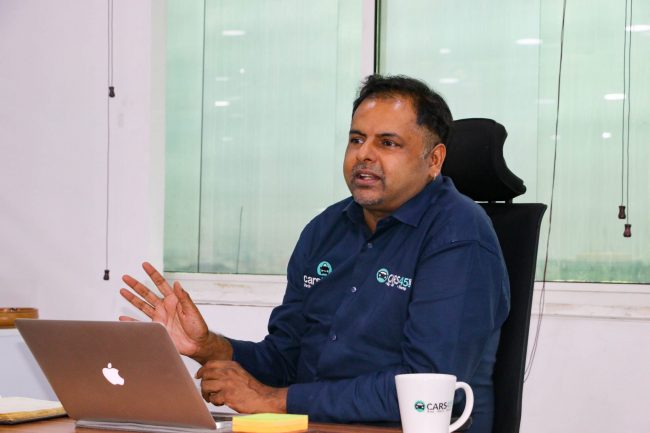Soumobroto Ganguly is the Chief Executive Officer of Cars45, a leading automotive trading platform in Africa.
In this exclusive interview with BizWatch Nigeria, Ganguly discusses the company’s recent merger with Jiji, including how the firm has managed to thrive despite the global pandemic.
The interview also touches upon the changing car model from combustion engine to electric and the how African countries can join the transition.
What informed the merger between the Cars45 and Jiji?
A few months ago, we started discussions on how we can collaborate and partner on our operations, but the debate about whether it is a merger or acquisition will be addressed by our shareholders. As the CEO of the business, my main purpose is to see how we can manage the operations of the businesses and synergise to get the benefit for both organisations working together.
How do you plan to achieve that?
We have set up several teams that we are working with on the integration and they will come with recommendations on how we can leverage each other, a clear picture will emerge in August and September.
But clear areas are clear to us on how we can partner. They have a very strong and large database of dealers, seller and merchants and we have out transaction process worked out and we also have locations in about three countries where we operate. We believe that coming together, we will have a large number of customers.
We on our own can do a lot more for the customers by providing transparency and inspection services and finally ending in sales. That is how we work together.
Does this mean Cars45 and Jiji will retain their brand names?
For the moment, yes.
How is Cars45 keying into the future of mobility in terms of electric cars?
We have made very big steps though we are not manufacturers or distributors. We are in the digital space to automate transactions. We only see what is currently happening in the market and that is still very much combustion engine. We may have traded two or four electric cars but my personal view about Electric Vehicles market and Africa is that it can happen much faster because the filling station network is laid across Africa and can be easily upgraded into charging stations. If the government puts an end to the age of cars that are brought into the country, nothing beyond 8 to 10 years can come in, we could be pushed towards electric cars consumption.
What is the average age of cars that are traded on your platform?
We generally trade in Nigerian used cars and the average age of cars we trade is between 11 to 12 years. It is quite different from other markets where the average age does not exceed 4 or 6 years.
READ ALSO: FG Urges Striking Resident Doctors To Return To Negotiating Table
Are there existing partnerships between Cars45 and automobile companies assembling vehicles in Nigeria?
We have about four to five partnerships with Stallion Motors, Coscharis and all the OEM players. We have trading offer for customers in all our outlets where we encourage people to trade in the old cars and buy a new car.
The perception is that Cars45 deals in used cars.
It’s true. That perception is 95 percent of our business but five percent is new cars and we are trying to expand that. In the whole market itself, new cars are much less that used cars.
In terms of affordability, do you offer flexible payments option to customers?
We launched a product about two months ago which allows people to have pre-approved credit, whether they can buy a car and get 75 per cent financing from our banking partners.
You must have a good credit history and if you work for a multinational company or established Nigerian company and have a salary domiciled account, that helps your track record.
If you are bringing between 25 to 30 per cent as your own contribution, this also helps.
We also limit the kind of cars we offer financing for so that after you take the financing, the cars do not breakdown, we have identified cars that are eligible for the financing. If you’re currently serving a debt, you can’t access financing.
Nigeria is known as one of the top markets for used cars. Do you see this changing in the next 10 years?
That is very unlikely because as the government through the Customs change the duty to encourage imports of used cars and that will always be a challenge. Affordability being the primary reason with the naira slipping against the dollar constantly, the gap between a used car and new car has Increased. A new car costs way beyond the scope of an average Nigerian. Affordability and because new car dealers want the money upfront but the gap is so high.
READ ALSO: UAE Relaxes Travel Restrictions For Nigerians, Others
What can be done to change this trend?
How the China, India and Koreans did it was to completely ban used vehicles. It is a savage approach if you want to grow your own home-grown industry, that is the only way to go. Give incentives for people to buy locally assembled vehicles from Innoson or any other manufacturer. Unless people are compelled to do that; because given a choice between a 10 year-old Corolla and Innoson vehicle, 99 per cent will choose the Corolla.
They have no opportunity to build the brand and local manufacturers are challenged by their own problems – land, power, availability of inputs such as skilled manpower, robots and electronics.
We have working with a number of Universities, including LASU where we take fresh students and train them on technical operations of an automobile engine and electronics so that they don’t learn the bad habits of an old school mechanic and they learn fast the new technologies in cars.
There are reports that car dealers import used cars from China. Should this be a cause of concern?
There is no official ban on used cars from China but the natural barrier against this is that the cars are actually manual transmission and Nigerians prefer automatic transmission. Secondly, the model shapes and availability of spare parts is still not there, but Chinese importers being industrious as they are will source for that.
In terms of quality, the Toyota made in China is as good as the Toyota made in the US. However, the concern might be that the possibility of flooding the market with Chinese used car brand, bringing attractive price points but they will never support the specs.
Are government policies in the automobile industry in favour of marketplaces like Cars45?
The government has really been supportive especially in the area of transfer of ownership. We have red-flagged stolen cars . we work with the government closely on that. As soon as we realized the cars coming to us is stolen, we flag it.
What has been the impact of the pandemic on the automobile industry in Nigeria?
It has been severe and tough. Car sales were down substantially last year at the peak of the pandemic and it was because people didn’t commute to work and there was no need to buy a second car or take public transport. Also, there was a big gridlock at the ports because of the pandemic and a lot of people lost money.
Also because of the falling exchange rate, people that imported cars could not clear them because Customs asked for 25 per cent.
It really affected us in our different regions because all our inspection centres were closed and that is a major source of our supply and the EndSARS protest affected us.













